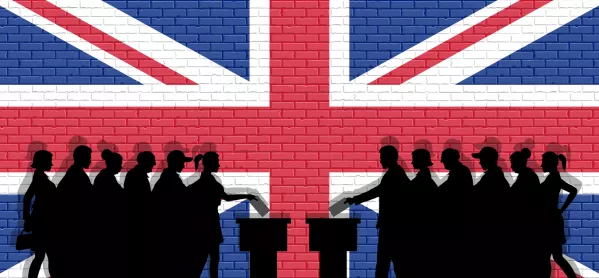A primary teacher recently posed this question on Twitter: “Are you fit to be a teacher if you vote Tory in the next election?” In response to posting the poll, the teacher received “a literal influx of hate mail” and “threatening messages”. Among other things, he was called “lefty liberal scum”.
Another teacher recently found themselves in a Twitter spat with Tom Harwood, who works for right-wing political blog Guido Fawkes. The teacher said that chatting with her Year 8 (S2) students had “restored” her faith. After she told them there was to be a general election, one pupil said: “Does that mean that wasteman Boris Johnson is gone?”
The tweet prompted Harwood to call for “impartiality guidelines” for teachers, similar to those that apply to civil servants.
Opinion: Political awareness is vital - but who is teaching it?
Related: How to help students ‘channel outrage’ about the world
Background: Teachers refusing to discuss ‘controversial’ Brexit with pupils
Nothing underlines that we are approaching a general election like one side trying to silence the other. Add to this the fact that, for years now, we have heard nothing but how divided we are as a country, and how poisonous the debate has become, and teachers might feel like donning a hazmat suit before broaching the topic of the general election in class. Or just not bothering at all.
Scottish academics have criticised schools and teachers for failing to tackle divisive topics such as Brexit. Daniela Sime, a reader in social policy at the University of Strathclyde in Glasgow, said she had lost count of the number of pupils who said their teachers did not want to discuss Brexit as it was “too controversial”.
However, a modern studies teacher recently argued in Tes Scotland that it was imperative for political literacy not to be confined to her department.
Gillian Freeland pointed out that, although the popularity of modern studies was rising, some schools still did not offer it at all, while some offered it only in the early years of secondary and others only to senior pupils.
She concluded: “As educators, we all have a role to play in supporting our young people to debate and participate in our ever-changing political climate.”
So, how far should teachers go when it comes to expressing their own views? The person who created the poll about Tory teachers did so on Twitter, not in the classroom - but as a teacher do you have the same freedom to pin your political colours to the mast?
Yes, but not in school, says Larry Flanagan, general secretary of the EIS teaching union.
The updated General Teaching Council for Scotland standards and professional code - both of which are currently out for consultation - state that teachers should “actively engage learners in debate and decisions about their education, the world and its challenges”, and help learners to “understand different views, perspectives and experiences”.
However, teachers are also warned to be mindful of their own “assumptions, biases and personal beliefs “
Flanagan says that teachers should not seek to influence the political views of their pupils. He believes that most teachers would refrain from sharing who would get their vote in an election - as would he.
“The general guidance is, as far as possible, teachers should not convey personal opinions. Most young people would have the potential to be influenced by a teacher they liked; we have to make sure we don’t cross that threshold.”
Regarding the general election, Flanagan’s advice is that teachers should act as facilitators and give pupils a platform to explore their own views. He suggests looking at the party manifestos and at the difference between fact and opinion, running mock elections, and asking young people what they think about 16- and 17-year-olds being denied the vote.
Ultimately, Flanagan says he is confident that most teachers - depending on their subject and the age group they are teaching - will grasp the opportunity presented by the 12 December election with both hands.
Let’s hope he is right, because we need the next generation to learn from our mistakes, to do a better job of talking about and despite of their differences - and, most importantly, to raise the level of debate.
Emma Seith is a reporter for Tes Scotland. She tweets @Emma_Seith





